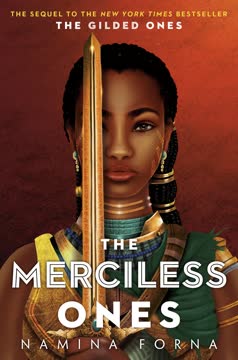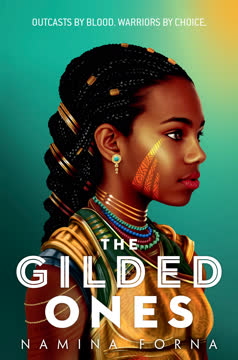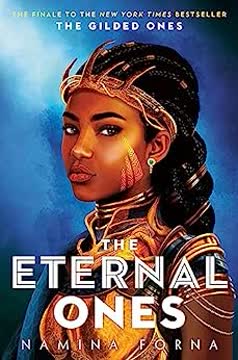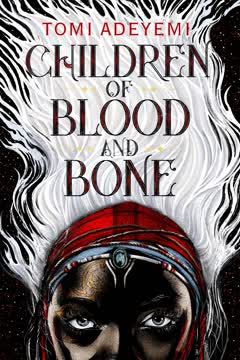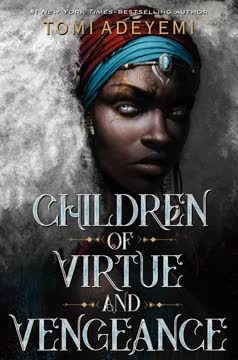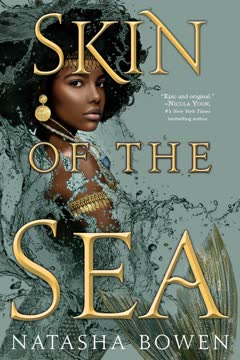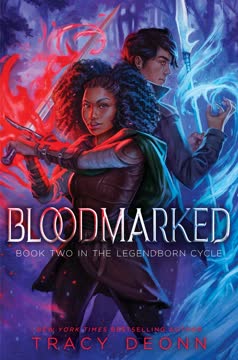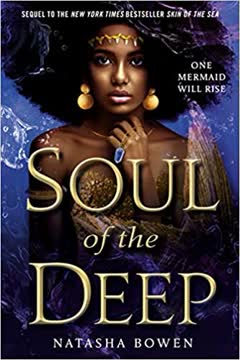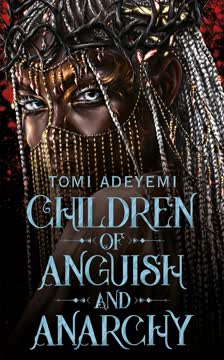Plot Summary
Corpses at the Jungle's Edge
Deka and her bloodsisters encounter a gruesome warning: four young women's corpses staked at the jungle's edge, bellies swollen, faces masked. The stench and sight shake Deka, but she steels herself, comforted by the touchstone necklace from her divine mothers. A grieving mother blames Deka for her daughter's death, accusing her of bringing chaos and false hope. Deka offers the woman sanctuary in Abeya, the city of the goddesses, but is forced to confront the cost of rebellion and the suffering of ordinary women. The encounter is a bitter reminder of the price of change and the burden of leadership, setting the tone for Deka's journey—a quest shadowed by guilt, responsibility, and the ever-present threat of violence.
Oyomosin's Burning Secret
Deka and her companions infiltrate the Oyomosin, a temple built atop a dormant volcano, to rescue Melanis, a legendary Firstborn alaki. Inside, they find Melanis chained and burned alive for centuries, her body a ruin of agony and resilience. The priests guarding her are blind, their faith a weapon, but Deka's team overcomes them in a brutal battle. Deka's own trauma resurfaces as she faces the flames, but she presses on, using her divine blood to melt Melanis's chains. The rescue is both a victory and a revelation: Melanis's suffering is a living symbol of the alaki's oppression, and her return is vital to restoring hope and power to the goddesses' cause.
Melanis, Light in Chains
Freed from her torment, Melanis is a shell of her former self, her mind fractured by centuries of pain. Deka's touch triggers a vision—she glimpses a white chamber, a kneeling man, and a sense of lost identity. The rescue is interrupted by the arrival of true jatu, men with divine blood immune to Deka's commands, protected by a mysterious golden symbol. In the ensuing chaos, Melanis's power erupts: her wings return, and she becomes a force of destruction, slaughtering the jatu. Yet the victory is tainted—one jatu revives, golden blood flowing, shattering the rules of death and resurrection. The boundaries between enemy and kin blur, and Deka's certainty begins to unravel.
Jatu's New Immortality
The revelation that true jatu can now resurrect like alaki shakes Deka and her allies. The jatu's leader claims the blessing of Idugu, a god of war and death, and hints at a new, terrifying power. The golden symbol on their armor blocks Deka's divine voice and enables their unnatural revival. The group realizes that arcane objects—artifacts of the goddesses—are being used against them, siphoning divine power and rewriting the rules of life and death. The threat is existential: the jatu are no longer mere men, but immortal adversaries, and the goddesses themselves are weakened, unable to intervene directly.
The Golden Symbol's Curse
Deka and her generals convene in Abeya, the city of the goddesses, to analyze the golden symbol—now called the kaduth. It is an arcane object that blocks the Nuru's power and enables jatu resurrection. The goddesses reveal the existence of the angoro, a golden throne that siphons their power and sustains the jatu's new abilities. Deka learns that her own actions—imprisoning the emperor—triggered the angoro's awakening, further weakening the goddesses. The lines between ally and enemy blur, and Deka is forced to question her role as the Nuru, her trust in the mothers, and the true nature of the divine war.
The Gilded Ones' Weakness
The goddesses, once all-powerful, are now shadows of themselves, their strength drained by the angoro and the lack of worship. They confess to Deka that they cannot die, but can fade into oblivion—becoming mindless energy. The only way to restore balance is to find and destroy the angoro's wielder. Deka is given a new purpose: to capture Elder Kadiri, the high priest, and use him to locate the angoro. The goddesses' vulnerability is laid bare, and Deka's faith is shaken. She is no longer just a chosen daughter, but a weapon in a war of survival, tasked with saving her mothers and her world.
The Angoro's Awakening
Deka and her companions embark on a covert mission to capture Elder Kadiri during the Festival of the Half Light. Disguised as travelers, they navigate a city teeming with jatu and priests, only to discover a trap: the enemy has anticipated their every move. The Lady of the Heart, a priestess from Deka's past, exposes her identity, and the group is ambushed by jatu and Forsworn deathshrieks. In the chaos, Deka's friends are killed and resurrected, transformed by her own latent power. The angoro's influence is everywhere, and Deka realizes she is both a target and a key—her blood, her will, and her choices are central to the fate of gods and mortals alike.
Betrayal in the Temple
The group's escape from the ambush leads them to the Grand Temple, where Deka confronts the Idugu—the male counterparts to the goddesses. The Idugu reveal their own history of betrayal, starvation, and vengeance, blaming the Gilded Ones for their imprisonment and the creation of Oyomo, the false god. Deka is shown visions of cosmic division, the severing of divine bonds, and the manipulation of mortals for worship and power. She learns that both sides are complicit in the cycle of violence, and that she herself is the angoro—the golden power that can end the gods. The realization is devastating: Deka is not a daughter, but a weapon, and the gods are not saviors, but monsters.
The Truth of the Idugu
Deka's visions reveal the true nature of the divine conflict: the Gilded Ones and the Idugu were once a single, balanced entity, split by pride and human influence. Both sides have manipulated mortals, demanded worship, and committed atrocities to sustain themselves. The Idugu, starved of worship, created Oyomo and the Infinite Wisdoms to feed on human suffering and obedience. The Gilded Ones, in turn, have consumed their own children—male deathshrieks—using blood-eater vines to harvest power. Deka's role as the angoro is to end this cycle, to become the blade that can kill gods. The burden is immense, and the path forward is uncertain.
The Forsworn's Rising
As the Idugu's armies march on Abeya, Deka discovers the true horror beneath the goddesses' temple: a pit filled with thousands of male deathshrieks, imprisoned and fed upon for centuries. The Forsworn, once thought rare, are revealed to be legion—victims of the Gilded Ones' monstrous hunger. The revelation is a breaking point for Deka, who realizes that the gods she served are as cruel and corrupt as their enemies. The battle for Abeya becomes a battle for the soul of Otera, and Deka must choose between loyalty and justice, between the old order and a new, uncertain future.
The Deathshrieks' Lament
The deathshrieks' agony echoes through the chamber, their pleas for release a testament to the goddesses' crimes. Deka, aided by her friends and the awakened powers she has given them, fights to free the deathshrieks and destroy the temple. The battle is brutal, with Melanis and White Hands forced to choose sides. In the end, Deka's power—amplified by her connection to the Singular, the neutral god—enables her to awaken the gifts of her allies and turn the tide. The temple falls, the blood-eater vines are destroyed, and the deathshrieks are released from their torment. But the cost is high, and the wounds—physical and spiritual—are deep.
The Mothers' Monstrous Hunger
Etzli, one of the Gilded Ones, is unmasked as a predator, feeding on the suffering of her own children. The goddesses' hunger is insatiable, their morality twisted by millennia of power and pain. Deka's confrontation with Etzli is both physical and existential—a battle for the meaning of motherhood, divinity, and selfhood. The goddesses' manipulation of Deka, their use of the ansetha necklace as a collar, and their willingness to sacrifice anyone for power shatter the last remnants of Deka's faith. She is no longer the Nuru, the obedient daughter, but the angoro—the slayer of gods.
The Nuru's True Origin
In a final vision, Deka learns that she is not the child of the Gilded Ones, but the incarnation of the Singular—the neutral, original god who remained apart from the divine war. Her purpose is to restore balance, to end the cycle of violence and worship that has corrupted both sides. The ansetha necklace, once a symbol of love, is revealed as a tool of control, and Deka's true power is unleashed only when she rejects it. Her friends, empowered by her gift, become her new family, and together they vow to end the gods' tyranny. Deka's journey is no longer about obedience, but about agency, justice, and the forging of a new path.
The Battle for Abeya
As the Idugu's armies assault Abeya, Deka and her allies unleash their awakened powers to defend the city and destroy the goddesses' stronghold. The battle is cataclysmic—flames, wind, earth, and gold tearing through the temple, the abyss of deathshrieks collapsing, and the Gilded Ones' power broken. Anok, the oldest goddess, urges Deka to finish what she began: to kill the gods and free Otera from their grasp. The cost is immense—Deka's own body begins to break down from the strain, and the world is left on the brink of chaos. But hope endures, and the promise of a new order is born.
The Fall of the Gods
With the temple destroyed and the gods wounded, Deka and her friends flee into the desert, pursued by the remnants of divine power and the uncertainty of what comes next. The world is changed—no longer ruled by the old gods, but not yet free of their influence. Deka's body is failing, her divinity incomplete, but her resolve is unbroken. The journey ahead is long, and the task unfinished, but the first step has been taken: the gods can be killed, and a new dawn is possible.
Becoming the Angoro
As Deka and her companions travel toward Gar Nasim, the place where her mortal mother waits, she reflects on her journey from pawn to angoro, from daughter to slayer of gods. The lessons of pain, betrayal, and love have forged her into something new—a being capable of both destruction and creation. Her friends, now empowered and immortal, are her chosen family, and together they vow to build a world free from the tyranny of gods. The path is uncertain, but Deka's purpose is clear: to reclaim her divinity, to restore balance, and to ensure that no one—mortal or divine—ever suffers as she has.
The Road to Divinity
The aftermath of battle is a time of grief, reflection, and renewal. Deka mourns her losses, tends to her wounds, and begins the process of becoming whole. The scars of the past are deep, but the bonds of friendship and love are stronger. As the group travels through the desert, they share stories, comfort each other, and dream of a future where power is not built on suffering. Deka's body may be failing, but her spirit is unbroken. The road to divinity is long, but she is not alone.
A New Dawn's Blade
As the sun rises over the horizon, Deka stands at the threshold of a new era. The gods are wounded, the old order is broken, and the future is unwritten. With her friends at her side and the power of the Singular awakening within her, Deka vows to become the blade that will end the gods' reign. The journey is not over—the battle for Otera's soul has only just begun. But for the first time, hope is real, and the possibility of a world without monsters—divine or mortal—shines on the horizon.
Characters
Deka
Deka is the Nuru, the supposed chosen daughter of the Gilded Ones, marked by her golden blood and unique powers. Haunted by trauma, guilt, and the burden of leadership, she is both a symbol of hope and a tool of war. Her journey is one of self-discovery and disillusionment: she learns that she is not a daughter, but the angoro—the blade meant to kill gods. Deka's relationships are defined by loyalty, love, and betrayal: she is fiercely protective of her bloodsisters, deeply bonded to Keita and Britta, and increasingly alienated from the goddesses she once worshipped. Psychologically, Deka is shaped by pain and resilience, her empathy and rage driving her to challenge the very foundations of her world. Her development is a transformation from pawn to agent, from victim to slayer of gods, and ultimately, from mortal to something divine.
Britta
Britta is Deka's closest companion, a Northern farm girl transformed by war and hardship. Her divine gift is the power to shape earth and stone, a reflection of her steadfastness and strength. Britta is the emotional heart of the group—loyal, nurturing, and unafraid to challenge Deka when needed. Her relationship with Li blossoms into love, but her primary bond is with Deka, whom she supports through grief, doubt, and crisis. Britta's psychological arc is one of growth from innocence to wisdom, learning to balance vulnerability with courage. She is the embodiment of chosen family, the anchor that keeps Deka grounded and hopeful.
Keita
Keita is a former jatu, marked by loss, guilt, and a longing for redemption. His divine gift—control over fire—mirrors his inner turmoil and the destructive power of rage. Keita's relationship with Deka is central: he is her lover, confidant, and equal, sharing both her burdens and her dreams. Psychologically, Keita is shaped by trauma and the struggle to reconcile his past as a deathshriek hunter with his present as an ally to the alaki. His resurrection by Deka's power transforms him into something new—immortal, empowered, and free to choose his own path. Keita's arc is one of healing, acceptance, and the forging of a new identity beyond the roles imposed on him.
Belcalis
Belcalis is a former pleasure house captive, hardened by suffering and skilled in the arts of healing and battle. Her divine gift is the ability to turn her blood into golden armor, a manifestation of her resilience and self-protection. Belcalis is pragmatic, sharp-tongued, and fiercely loyal to her friends, especially Deka. Her psychological journey is one of reclaiming agency, learning to trust, and finding strength in vulnerability. Belcalis's development is a testament to the power of survival and the possibility of transformation, even in the face of unimaginable pain.
Adwapa and Asha
The twins are inseparable, their bond a source of strength and comfort. Their divine gift—control over wind—reflects their adaptability and unity. Adwapa's longing for her lost love, Mehrut, drives much of her arc, while Asha is the more pragmatic and supportive of the pair. Together, they represent the importance of chosen family, the healing power of love, and the resilience required to survive in a world that seeks to destroy them. Their development is a journey from loss to reunion, from despair to hope.
Katya
Katya is a former alaki who dies and is resurrected as a deathshriek, becoming a living link between the two forms of existence. Her struggle is one of identity and acceptance—learning to reconcile her monstrous form with her enduring humanity. Katya's relationship with Rian, her betrothed, is a source of both pain and healing, as she navigates the challenges of love across boundaries of life and death. Psychologically, Katya embodies the trauma of transformation and the possibility of redemption. Her arc is a testament to the enduring power of love and the necessity of embracing change.
White Hands (Fatu)
White Hands is the oldest alaki, a figure of mystery, wisdom, and hidden pain. As Deka's mentor, she guides, challenges, and sometimes manipulates, always with an eye toward survival and the greater good. Her divine gift—the power to turn things to ash—reflects her role as both destroyer and purifier. White Hands's relationship with the goddesses is fraught, marked by both loyalty and resentment, and her own identity as neither fully male nor female positions her as an outsider and a bridge. Psychologically, she is shaped by centuries of trauma, loss, and the burden of leadership. Her development is a journey toward truth, reconciliation, and the acceptance of her own complexity.
Melanis
Melanis is a legendary figure, revered for her beauty, power, and suffering. Her resurrection is both a miracle and a curse—she is both a beacon for the alaki and a tool of the goddesses' will. Melanis's loyalty to the mothers is absolute, her worldview shaped by centuries of pain and indoctrination. Psychologically, she is both victim and perpetrator, her actions driven by a desire for order, vengeance, and the restoration of a lost golden age. Her development is a cautionary tale about the dangers of blind faith and the cost of survival.
Etzli
Etzli is one of the Gilded Ones, the goddess most associated with life, fertility, and, ultimately, monstrous hunger. Her willingness to feed on her own children, to manipulate and destroy for power, marks her as both a victim of divine madness and an agent of horror. Etzli's relationship with Deka is one of control, betrayal, and fear—she sees Deka as both pawn and threat. Psychologically, Etzli is shaped by millennia of power, isolation, and the corrosive effects of worship and suffering. Her arc is a descent into monstrosity, a warning about the dangers of unchecked divinity.
The Idugu (Okot and brothers)
The Idugu are the male counterparts to the Gilded Ones, once part of a balanced whole, now corrupted by pride, hunger, and the need for worship. Their creation of Oyomo and the Infinite Wisdoms is both a survival strategy and an act of vengeance, perpetuating cycles of violence and oppression. The Idugu's relationship with Deka is manipulative—they see her as the angoro, the weapon that can end the gods. Psychologically, they are shaped by loss, resentment, and the corrosive effects of starvation and isolation. Their development is a mirror to the Gilded Ones—a descent from divinity to monstrosity, a warning about the cost of power.
Plot Devices
Divine Power and Worship
The central plot device is the relationship between gods and mortals: worship, sacrifice, and obedience feed the divine, while suffering and violence are both currency and sustenance. The Gilded Ones and the Idugu manipulate mortals to maintain their power, creating cycles of oppression, rebellion, and war. The angoro, the golden throne, is both a literal and symbolic source of power—its awakening marks the escalation of the divine conflict and the transformation of Deka into a weapon. The plot is driven by the ebb and flow of divine strength, the consequences of worship, and the struggle for agency in a world shaped by gods.
The Ansetha Necklace and Kaduth
The ansetha necklace, given to Deka by the goddesses, is both a touchstone and a collar—a tool of love and a means of control. It suppresses Deka's true power, binding her to the mothers' will. The kaduth, the golden symbol on the jatu's armor, is an arcane object that blocks divine commands and enables resurrection, shifting the balance of power and introducing new rules to the world. Both objects are plot devices that embody the themes of agency, manipulation, and the cost of obedience. Their destruction or removal marks key turning points in Deka's journey and the broader war.
Memory, Vision, and Truth
The narrative is structured around revelations—visions triggered by touch, blood, and trauma. Deka's ability to see into memories, both her own and others', is a plot device that uncovers hidden histories, divine secrets, and the true nature of the gods. The use of visions and dreams blurs the line between reality and illusion, forcing Deka (and the reader) to question what is true, what is manipulation, and what is possible. The gradual unveiling of the gods' origins, the cosmic split, and Deka's own divinity is a central engine of suspense and transformation.
Betrayal, Agency, and the Chosen One Subversion
The story subverts the traditional chosen one narrative: Deka is not a daughter, but a weapon; not a savior, but a slayer of gods. Her journey is marked by betrayal—by the goddesses, by faith, by the very concept of divinity. The plot is driven by her struggle to claim agency, to move from pawn to player, from victim to architect of her own fate. The use of foreshadowing, unreliable narration, and shifting alliances keeps the reader off-balance, mirroring Deka's own uncertainty and growth.
Analysis
The Merciless Ones is a searing, subversive epic that interrogates the nature of power, divinity, and agency in a world shaped by violence and oppression. Drawing on West African myth and feminist fantasy, Namina Forna crafts a narrative that is both a thrilling adventure and a profound meditation on trauma, faith, and the cost of survival. The novel dismantles the binary of good and evil, revealing gods and mortals alike as flawed, hungry, and capable of both cruelty and compassion. Deka's journey from chosen daughter to angoro—the blade that can kill gods—is a powerful allegory for self-actualization, the rejection of false narratives, and the forging of a new, just order. The story's use of plot devices—divine power, arcane objects, memory, and betrayal—serves to challenge the reader's assumptions and invite reflection on the cycles of violence that shape both history and myth. Ultimately, The Merciless Ones is a call to question authority, to seek truth beyond tradition, and to believe in the possibility of a world remade—not by gods, but by those who dare to break the chains of the past.
Last updated:
Review Summary
The Merciless Ones received mixed reviews, with an average rating of 3.89 out of 5. Many readers found it action-packed and enjoyed the expanded world-building, character development, and exploration of complex themes. However, some felt it lacked the strong feminist focus of the first book and had pacing issues. The romance subplot and sudden pairing of characters were criticized by some. Despite these concerns, many readers remained invested in the series and looked forward to the final installment, praising the author's writing style and the book's intense plot twists.
